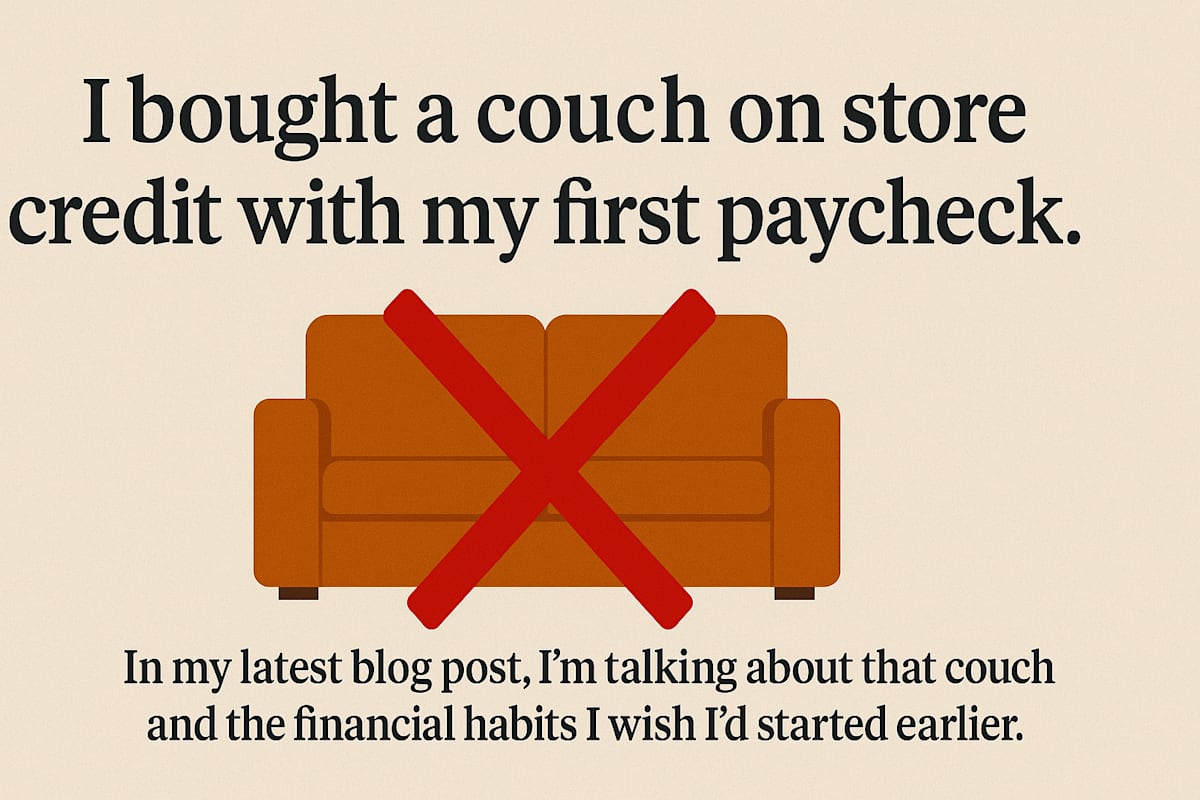When I got my first "real" job, I remember feeling so proud. The pay wasn’t glamorous, but to me, it was everything. I’d made it. I was earning my own money, wearing semi-professional clothes, and pretending I knew what “RRSP” stood for when people tossed it around at lunch.
Naturally, I celebrated by buying a giant sectional couch. On store credit. With interest that may as well have been highway robbery.
I was living in a 500-square-foot apartment. You couldn’t fully walk around the thing without turning sideways. But I’d convinced myself I deserved it. It felt like a rite of passage—some symbolic gesture of arrival. And when the store offered “easy monthly payments,” I nodded along like I totally understood how interest rates worked.
It wasn’t until a few months in—when the balance on that store card didn’t seem to be going down at all—that I realized what I’d signed up for. The couch had cost me far more than the sticker price, and I hadn’t even spilled anything on it yet.
So, when people ask me why I started this book with financial literacy, that couch is one of the reasons. I didn’t know how to budget. I didn’t really understand credit. And I certainly didn’t grasp how “buy now, pay later” can turn into “pay forever, with interest.”
If you’re reading this as a young adult just starting out, let me tell you something I wish I’d heard: your money is one of the few things you actually get to control when life feels like a whirlwind. And learning how to manage it doesn’t make you boring or overly cautious. It makes you prepared—and that’s way more empowering than a comfy couch (though, admittedly, a comfy couch is nice too… when you actually own it).
And if you’re a parent reading this, maybe trying to figure out how to help without stepping on your child’s independence—I see you too. I remember the well-meaning advice from my own parents. Some of it landed. Some of it went in one ear and out the other, only to resurface years later when I was elbow-deep in store credit regret. What helped most? The times they listened and shared their own stumbles—without judgement or a financial sermon.
I didn’t write about budgeting and credit scores because I think they’re thrilling (although I do find a weird satisfaction in balancing a budget now—don’t judge me). I wrote about them because understanding how money works gives you choices. It lets you say yes to opportunities without stressing about how you’ll pay for groceries that week. It gives you freedom. And for many of us stepping into adulthood, that’s the goal.
I’m not perfect with money. I still make the occasional emotionally-charged purchase (hello, late-night skincare ads). But I’ve learned how to check in with myself first. I’ve learned how to make room for saving and fun. And more importantly, I’ve learned that financial literacy isn’t about having it all figured out—it’s about building a system that works for you, so you can stop feeling guilty and start feeling in control.
So if you’re just starting this journey, or helping someone who is, don’t get overwhelmed by the acronyms and the spreadsheets. Start small. Track what you’re spending. Learn the difference between needs and wants. (Couch on credit = want. Groceries = need. Sigh.) Open a savings account even if you’re only adding a few bucks a week. It adds up. You’ll see.
And if you do splurge on something slightly impractical, that’s okay too. Just make sure it’s a conscious choice—not a high-interest impulse one.
The goal isn’t perfection. It’s progress. And trust me, even if your first budget is more “vibes” than math, you’re already ahead of where I was.
